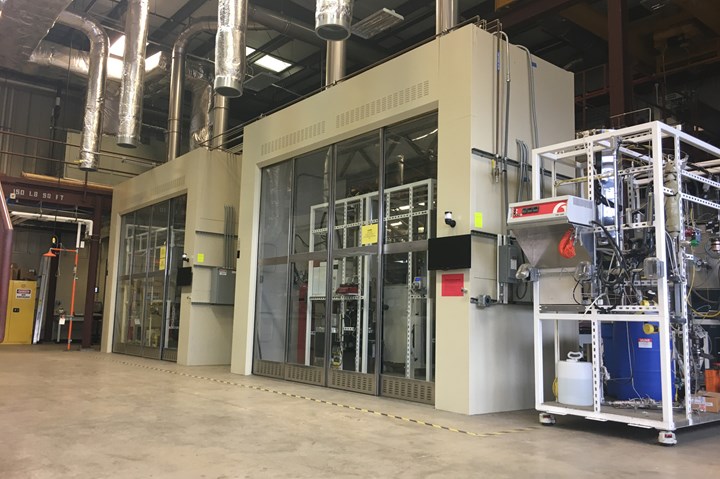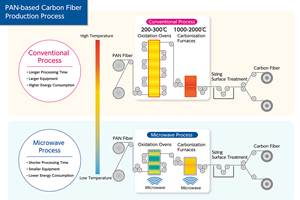Trillium Renewable Chemicals to accelerate commercialization of feedstock-based chemical technology
Patented chemical manufacturing platform from Southern Research to convert renewable feedstocks to acrylonitrile, propylene glycol and acrylic acid products.

Photo Credit: Trillium Renewable Chemicals
Capricorn Partners (Leuven, Belgium) and Southern Research (Birmingham, Ala., U.S.) have jointly created a new Alabama-based startup company Trillium Renewable Chemicals (Birmingham). Southern Research has exclusively licensed its patented chemical manufacturing platform to Trillium to accelerate commercial development of this new technology.
According to both companies, the majority of the more than 350,000 chemical products in circulation are currently made from oil or natural gas. However, bolstered by scientific advances, changing consumer preferences and regulatory pressures, a growing number of chemicals will be made from renewable feedstocks in the future.
Trillium Renewable Chemicals is poised to address this fast-growing market segment through commercialization of the technology invented by Southern Research. The technology converts renewable feedstocks, such as sugar or glycerol to chemical products like acrylonitrile, propylene glycol and acrylic acid. These products are currently manufactured from oil and gas and used to make many familiar consumer and industrial goods like clothing, toys, car parts, sporting goods, paints, soaps and other valuable materials.
“Southern Research is excited to team up with Capricorn Partners to further the development of our patented technology,” says Michael Catalano, COO for Southern Research. “With the foundation of Trillium and focused management, we will be able to maximize the commercial potential, which is the ultimate goal and is in line with our strategy to monetize intellectual property for reinvestment in future scientific endeavors.”
Trillium and Southern Research will continue to work jointly on the process development, while Trillium will team up with strategic partners for the scale up and deployment of the technology.
Corey Tyree, CEO of Trillium Renewable Chemicals adds: “Trillium will demonstrate the commerciality of this technology. Local production from renewable resources can meet the growing demand for green chemicals and offer stable pricing and a more secure supply chain. The market interest is there. To address it, the industry needs enabling technologies such as the catalyst discovered by Southern Research.”
According to Amit Goyal, lead inventor from Southern Research, the company has developed an innovative, thermo-catalytic process that uses biomass derived sugars or glycerol, allowing for the use of a variety of biomass feedstocks, to produce acrylonitrile and other co-products. Goyal says this process has the potential to improve economics and the overall environmental footprint of downstream products that use acrylonitrile as a raw material.
Capricorn Partners has invested from its Capricorn Sustainable Chemistry Fund. The proceeds will be used to scale up the process for the manufacturing of acrylonitrile and glycols. “We spotted the Southern Research Technology over two years ago and have been following the development closely as well as exploring market opportunities in Europe and the U.S.,” says Wouter Van de Putte and Rob van der Meij, of Capricorn Partners. “This type of ‘green drop-in’ molecule technology has a great advantage over new ‘green’ molecule developments in that the applications are already fully developed.”
The Capricorn Sustainable Chemistry Fund, with a committed capital of €86.5 million, is aiming to capture the growing opportunities emerging from novel feedstocks, innovative and sustainable processes, more performing functional materials and smarter use of precious raw materials. Capricorn invests in companies which combine sound financial returns with a material contribution to and a front-runner view on developments in sustainability and advanced materials, processes and products. The fund focuses on companies that are in or near revenue stage and provided that the technologies and products are disruptive and have the potential to significantly address global markets.
Related Content
Watch: A practical view of sustainability in composites product development
Markus Beer of Forward Engineering addresses definitions of sustainability, how to approach sustainability goals, the role of life cycle analysis (LCA) and social, environmental and governmental driving forces. Watch his “CW Tech Days: Sustainability” presentation.
Read MoreMicrowave heating for more sustainable carbon fiber
Skeptics say it won’t work — Osaka-based Microwave Chemical Co. says it already has — and continues to advance its simulation-based technology to slash energy use and emissions in manufacturing.
Read MoreASCEND program update: Designing next-gen, high-rate auto and aerospace composites
GKN Aerospace, McLaren Automotive and U.K.-based partners share goals and progress aiming at high-rate, Industry 4.0-enabled, sustainable materials and processes.
Read MoreNovel composite technology replaces welded joints in tubular structures
The Tree Composites TC-joint replaces traditional welding in jacket foundations for offshore wind turbine generator applications, advancing the world’s quest for fast, sustainable energy deployment.
Read MoreRead Next
VIDEO: High-volume processing for fiberglass components
Cannon Ergos, a company specializing in high-ton presses and equipment for composites fabrication and plastics processing, displayed automotive and industrial components at CAMX 2024.
Read More“Structured air” TPS safeguards composite structures
Powered by an 85% air/15% pure polyimide aerogel, Blueshift’s novel material system protects structures during transient thermal events from -200°C to beyond 2400°C for rockets, battery boxes and more.
Read MoreAll-recycled, needle-punched nonwoven CFRP slashes carbon footprint of Formula 2 seat
Dallara and Tenowo collaborate to produce a race-ready Formula 2 seat using recycled carbon fiber, reducing CO2 emissions by 97.5% compared to virgin materials.
Read More










.jpg;maxWidth=300;quality=90)












